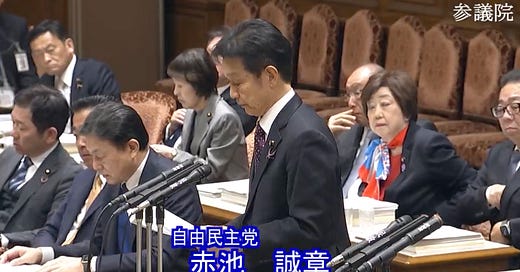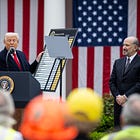Thank you for reading Observing Japan. This post is available to all readers.
If you are looking for timely, forward-looking analysis of the stories in Japans’s politics and policymaking that move markets, I have launched a new service through my business, Japan Foresight LLC. For more information about Japan Foresight’s services or for information on how to sign up for a trial or schedule a briefing, please visit our website or reach out to me.
I will be holding another monthly conference call for paid subscribers on Wednesday, 16 April at 9am EDT/10pm JST. Stay tuned for more details and upgrade to a paid subscription below to join.
You can find an article I wrote for Nikkei Asia on how Ishiba Shigeru can navigate the domestic politics of the “Trump Shock” here. Nikkei Asia also published an English version of an interview originally published in Japan on political reform here.
I was also quoted in the New York Times here on how world leaders are responding to the US tariffs.

The audit committee of the House of Councillors met on Monday, 7 April with Prime Minister Ishiba Shigeru and other members of his cabinet in attendance. Much of the discussion, naturally, focused on the Trump administration’s “Liberation Day” tariffs and the outlook for negotiations between Japan and the United States, which were formally launched at the ministerial level later that day, following a Monday evening (Japan time) call between Ishiba and US President Donald Trump.
While much of the discussion focused on the Ishiba government’s response – Ishiba has continued to face criticism for reacting sluggishly and failing to negotiate with Trump directly – I found something that Akaike Masaaki, a Liberal Democratic Party (LDP) lawmaker, said in his remarks opening the session worth considering.1
“Russia’s invasion of Ukraine was an act severely destructive of the international order through its use of force to change the status quo,” he began. “But,” he continued:
I think it must be said that these reciprocal tariffs are a problem that has shaken international economic affairs to their very foundation. This is despite the fact that the United States itself led the free trade system, having learned the lessons of trade blocs from before the war. This is a national crisis for our country, which under the free trade system has grown to the point of being called an ‘economic superpower’ and ‘trading nation.2
Akaike, a strongly conservative lawmaker who was once a member of the Abe faction and was one of Takaichi Sanae’s endorsers in the 2024 LDP leadership election, may have his own reasons for pressuring the prime minister on his handling of the Trump Shock. But I think it is worth taking Akaike’s words seriously on their own terms.
I was in Japan when Trump and Vice President JD Vance dressed down Ukrainian President Volodymyr Zelenskyy in the Oval Office, an incident that was received with alarm in Tokyo. In my conversations, I found that the significance was not lost on Japan’s leaders. However, there was still a sense – perhaps a hope – that the extravagant pressure on Ukraine was part of an “Asia First” pivot from Europe to Asia and that it did not necessarily augur the US abandonment of Japan and other Asian allies, even as US allies in Europe immediately understood the importance of the “Zelenskyy moment” for their own security.
By likening Trump’s “reciprocal” tariffs to Russia’s invasion of Ukraine, I think Akaike has, whether intentionally or not, suggested that Trump’s “Liberation Day” was Japan’s own “Zelenskyy moment.” Watching the US president recklessly and flamboyantly announce hefty tariffs on both major US trading partners and uninhabited islands, it became virtually impossible to deny that, whatever promises Trump and his advisers have made to continue to defend Japan, there existed a massive gap between an “America First” US and a Japan that, as Akaike suggests, conceives of itself as a trading nation dependent on an open global economy for its security and prosperity. Trump’s actions on 2 April made it impossible to deny that Japan is dependent for its security on, as I wrote in Foreign Policy in the days between Secretary of Defense Pete Hegseth’s visit to Japan and Liberation Day, “a United States whose behavior is increasingly not just at odds with but actively hostile to Japan’s own national interests and beliefs.” The Trump administration’s justifications for the Liberation Day tariffs – for instance, the argument made by Stephen Miran, chair of the Council of Economic Advisers, at the Hudson Institute on 7 April that “to benefit from the U.S. geopolitical and financial umbrella, then [US allies] need to pull their weight, and pay their fair share” – only serve to deepen the feeling that for Japan there is no going back to the status quo ante.
To be sure, this cognitive awakening does not mean that Japan will abandon its alliance with the United States before Washington can abandon it first or that the Ishiba government will not make a serious effort to convince the Trump administration to reduce or lift the “reciprocal” tariffs as well as the automobile tariffs. Japan’s establishment is not yet ready for a more decisive shift towards strategic autonomy in the manner of Germany, France, and other European powers in the wake of the Zelenskyy moment. But Akaike’s questioning suggests that “Liberation Day” has already shaken Japanese thinking about its relationship with the United States. Later in his remarks, Akaike drew on long-standing conservative ideas for national defense — revising textbooks to encourage more patriotism, revising Article 9 of the constitution to loosen constraints on Japan’s armed forces, and establishing an proper intelligence agency — but even if they are old ideas, they may be presented with a new urgency and a new resonance in this context.
Ultimately, even if trade negotiations with the United States – formally launched following a call between Ishiba and Trump on Monday – deliver some relief for Japan, Japan’s leaders will no longer be able to assume that, as former prime minister Kishida Fumio argued before the US Congress almost one year ago today, it can look to Washington to “[make] noble sacrifices to fulfill its commitment to a better world,” upholding an order from which many – including the United States – have prospered.
The Japanese people and their leaders are still in the early stages of thinking through the decisions they will have to make about Japan’s place in the world. But it is increasingly hard to deny that they recognize that new questions have to be asked and answered.
Akaike provided some notes on the hearing on his blog, though not a transcript of his remarks: https://ameblo.jp/akaike-masaaki/entry-12893027498.html.
My translation.






The quicker Japanese politicians can get through their five stages of grief about the US the better. Maybe Mark Carney should give Ishiba a call.